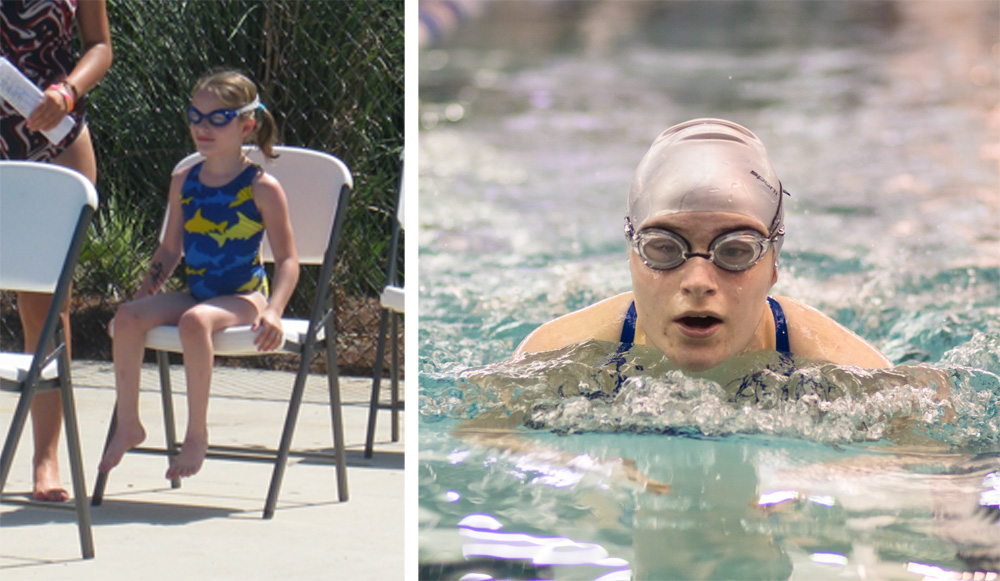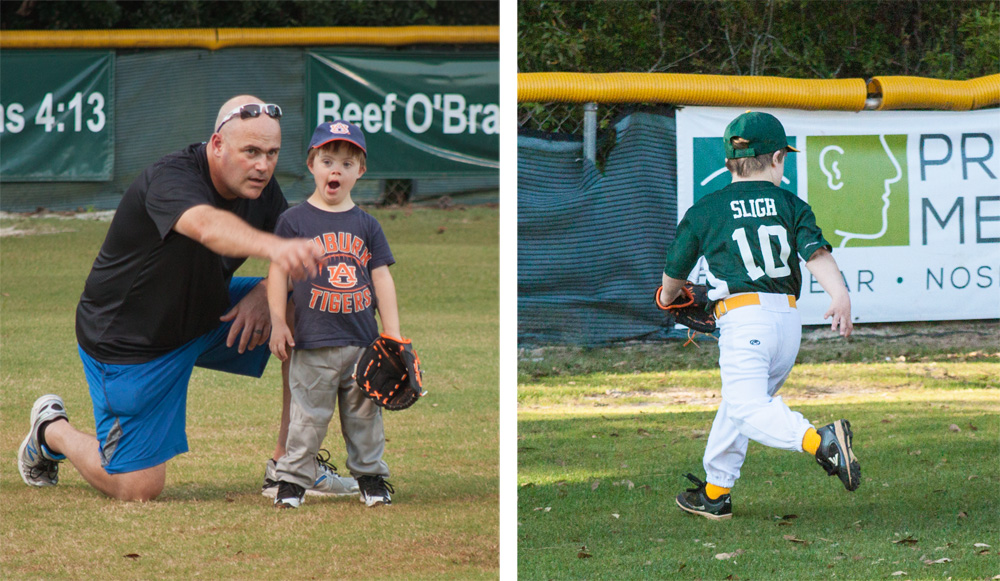The many stories I’ve shared here about softball, swim team, t-ball, and musical theater always receive positive responses from friends and strangers alike. Seeing an individual accomplish something against the odds strikes a chord in all of us – it’s inspirational and, at times, aspirational, especially if we can identify directly with that individual’s struggle.
But over the years I’ve often heard from readers who love Sarah Kate’s stories, but don’t apply her lessons to their own lives. Some parents seem to think that Sarah Kate is a special kid – their child couldn’t do what she does. Others want their child to try things, but are afraid – they suggest that I’m a special parent because I’m willing to let her do things.
Spoiler: We’re not all that special.
Of course, I would never advocate that a child be pushed to or beyond physical limits or placed in harm’s way, and not every kid with a disability can play a sport or sing and dance onstage. But our kids can do a lot more than we think they should.
Don’t hold your child back just because you’re afraid.
In the spring when Sarah Kate was seven, she enthusiastically shoved a flyer for swim team at me. I knew I could say no, but just the idea of her on a swim team made my insides churn with fear. Over dinner that night, she brought it up again and Mr. Andi gave me a look across the table that was as clear as if he spoke the words out loud: There. Is. No. Way. Eight years later, she’s now a state high school swimming record holder and qualified to swim in the US Paralympics Para-Swimming National Championships.

In the late fall just before she turned nine, Sarah Kate told us she wanted to play softball. Swimming was one thing, because she couldn’t fall down while in the water, but softball involved running and hitting and catching, all of which require fluid-ish movements, speed, and flexibility…none of which Sarah Kate had. She gave up softball after four seasons in two years, but during those two years she (and we) loved it.

Sarah Kate isn’t a special case, and neither am I.
Her cerebral palsy isn’t severe, but it also isn’t mild. An uneven patch of asphalt that most people wouldn’t notice can cause her to trip. In swimming she barely uses her legs in freestyle, backstroke, and butterfly, and doesn’t use them at all in breaststroke (and don’t forget, she doesn’t have enough control in her legs to even drive a car the regular way).
As for me, I’m not particularly brave or adventurous, as anyone who knows me well can attest, and I’m a natural introvert who hates to ask for favors or special treatment because I don’t want to bother or annoy people. I never thought Sarah Kate could do those things, but her enthusiasm made me wonder, “Is it possible?”
Do you see where I’m going?
We were lucky (or, as I prefer to believe, graced by God) with both swim team and softball. I knew the swim coach (a little) and as Sarah Kate’s P.E. coach at school, she knew Sarah Kate and her limitations. A friend of mine was on the board of the softball league. Both of them encouraged me to let Sarah Kate try, and made sure that she was placed in the right environment when I (fearfully) went along. With theater, we showed up cold and then let them know what the deal was (both ways worked, but the second way was a lot scarier).
With Nathan, we talked to the t-ball commissioner and she put Nathan on a team with a coach she believed would accept him. Now, with several seasons behind us, I realize that Nathan isn’t the kid that the coach has to take so he doesn’t seem like a bigot. Nathan is the kid that they like to have on their team because he loves to play, he’s always happy to be there, and his parents show up.

So… HOW do you let your child with a disability try sports?
- Pick the sport or activity.
- Talk to the coach/league/director.
- Put the practices, games, meets, and/or performances on your calendar.
- Show up.
It’s really that simple (but I didn’t say it was easy).
Watching balls being thrown at your baby who can barely stand up without support will not be easy.
Sitting in the audience asking Jesus to please not let your baby fall down during the big dance number will not be easy.
Worrying that your baby might drown during practice because you can’t quite see her from where you’re sitting and how-can-these-coaches-possibly-keep-up-with-this-many-kids will not be easy.
It’s simple but not easy, so let’s talk a little more about each step.
Pick the sport or activity.
If your child expresses an interest in something specific, see where it leads. Otherwise, pay attention to things your child likes to do that might translate into a sport or activity. Sarah Kate told us what she wanted to try. Nathan used Sarah Kate’s tee to hit balls in the backyard when he was a toddler so we signed him for t-ball (Note: Nathan also loved to run, which is why we briefly tried soccer, but it was a major fail. You might get it wrong, too, and that’s okay.)
Talk to the coach, league commissioner, or director.
Sometimes this person will be a friend or acquaintance or mutual friend of someone you know, but sometimes you won’t be that lucky. Have this conversation before you sign your child up if possible. Be honest and forthright about what your child’s limitations are as it relates to the activity, but don’t overshare – you don’t want your child to be treated like a vase that might break, and I promise your child can do more than you think! It’s also a great opportunity for your child to become his or her own advocate, letting the coach or director know when something is too hard (or impossible) but also letting them know when they can do more.
Put the practices, games, meets, and/or performances on your calendar.
I could say something about how it’s important to commit, etc., but you’re an adult and don’t need a lecture from me. The truth is that those dates are important because you will want to go to everything because you will want to be there in case something bad happens.
Show up.
Nothing bad will happen but you will be glad you were there because you will be so proud of your child and the other parents will tell you how brave she is and what an amazing mom you are for letting her get out there and that will feel amazing even though you will know you have them all fooled because you are just ordinary. I’m (mostly) kidding, but it is a good idea not only to be there in case questions come up involving your child, but to support the coach, as well. You need the coach to support your kid, so it’s only fair to plan to support the coach.
When you have a kid with a disability, you get used to having to swim upstream. Anything you do outside of the day-to-day norm means looking ahead to identify potential obstacles and figuring out a workaround for every possible scenario. Taking your child to something as simple as a birthday party requires extra planning and preparation! Sports and other physically demanding activities will require some extra effort, too.
But you don’t have to have it all figured out before you say yes. I promise.
P.S. If you need to know WHY you should let your child try activities that challenge them physically, here are a few: friendships, connections, sunshine, exercise that isn’t therapy, serving as an ambassador to the world, self-esteem, teamwork, commitment…

I’ve read your blog for many years. I found it shortly after my oldest son was born with Down syndrome. I was always in awe of you raising your two children, who both happen to have special needs. It fascinated me and I kept coming back to read your posts when I found spare time. Now i’m in your boat as well- raising two children with special needs- baby #5 was born a year ago, also with Down syndrome. Both boys were post birth diagnosis, the second time around a bigger shock than the first. I also have 3 children in between the two boys who are neuro-typical developing kids. Love reading your stories 🙂 My oldest son is 6.5 years old. I would like to start swimming lessons but wonder if it is too soon, or if now is a good time? I think (due to his nature) I would prefer to start him in private lessons, and then maybe integrate him into regular lessons once he learns to swim.
I’m so sorry – I thought I had replied to you and realized today I did not. Nathan started swim team at age 8, but we started swim lessons much earlier. He did a group lesson (but didn’t quite get the hang of it) at age 5, so the next summer when he was 6 we booked private lessons – we have some precious neighbors with a small pool that graciously allowed him to learn there. He STILL didn’t quite get the hang of it, but the instructor (same lady both years and she also taught Sarah Kate how to swim) told us that he was doing all the right things and just needed practice. We spent the rest of that summer and the next and eventually he got it.